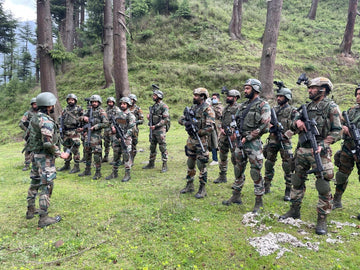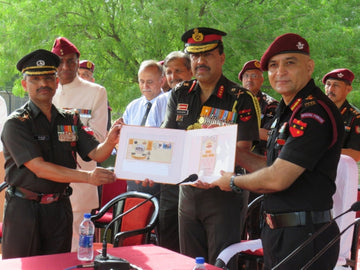Securing a position in India’s armed forces is a prestigious achievement and demands thorough preparation. Among the varied assessment stages, the Services Selection Board (SSB) personal interview is pivotal, and how candidates handle this intense interaction can often determine their fate. Understanding not only the technical content of potential interview questions but also mastering emotional and psychological resilience is critical to success. In this article, we delve into 10 essential tips designed to help candidates stay calm during their SSB personal interviews, optimizing both their performance and their confidence.
Historical Context
The SSB interview process has evolved considerably since its inception post-World War II, aiming to find the most capable candidates to serve in the Indian Armed Forces. Originally, the selection process consisted solely of interviews, but with advancements in psychological assessments and evaluation techniques, the modern-day SSB has incorporated various components, including group discussions, personality tests, and psychometric profiling. Therefore, the importance of interpersonal skills, composure, and situational awareness in these interviews cannot be underestimated.
The Importance of Calmness During Interviews
Calmness is a crucial trait that any candidate must display during the SSB interview. Not only does it contribute to effective communication, but it also influences how candidates respond to challenging questions or unexpected situations. According to psychological studies, maintaining a calm demeanor helps in regulating emotions, thereby improving cognitive function and decision-making skills. A key statistic indicates that anxiety can reduce performance by up to 40% in high-pressure situations like interviews (American Psychological Association, 2021). Thus, mastering anxiety-management techniques is essential for candidates.
1. Practice Mock Interviews
Mock interviews are vital for anyone preparing for high-stakes situations like an SSB interview. Engaging in realistic practice sessions simulates the actual interview environment, helping candidates experience pressure and polish their responses.
-
Benefits of Mock Interviews:
- Fluency: Participants get accustomed to verbalizing their thoughts.
- Self-Confidence: Familiarity with the interview format boosts self-efficacy.
- Feedback: Constructive feedback identifies strengths and weaknesses, guiding areas of improvement.
Experts suggest that candidates engage in at least 5-10 mock interviews before their actual SSB personal interview. Engaging with peers or experienced mentors who can provide critical evaluations can significantly enhance the candidate’s readiness.
2. Stay Updated on Current Affairs
Knowledge of current events is not merely a way to impress examiners; it establishes a foundation for more meaningful discussions.
-
Resources for Staying Updated:
- Leading national newspapers
- Defence journals and magazines like The Week and Forces.
- News apps and dedicated websites such as SSBCrack to get the latest Defence news.
Candidates should prepare by reading daily and reflecting on how different events relate to national and military strategies. Being well-informed enables candidates to engage confidently in discussions, showing their depth of understanding and awareness of the world around them.
3. Develop Effective Communication Skills
Effective communication is pivotal during the SSB interviews. It involves not just verbal but also non-verbal forms of expression.
-
Key Focus Areas:
- Articulation: Speak clearly and concisely.
- Body Language: Maintain eye contact and exhibit positive posture.
- Active Listening: Demonstrate engagement through nodding and responses.
Practicing these skills through role-playing exercises or by recording practice sessions for self-evaluation can reveal areas needing improvement.
4. Know Your Personal Details Inside Out
Interviewers often explore a candidate's background, including their education, family, and personal achievements.
-
Preparation Tips:
- Prepare a concise personal introduction covering key details.
- Be ready to discuss personal anecdotes that indicate the candidate's values and ethics.
- Familiarize yourself with the nuances of your educational and professional experiences as they relate to the role.
Understanding your personal story will help you answer confidently without unnecessary pauses or hesitation.
5. Stay Calm During Rapid-Fire Questions
Rapid-fire questions can be disconcerting, but remaining calm is crucial.
-
Mindfulness Techniques:
- Breathing Exercises: Inhale through the nose for four seconds, hold for four seconds, then exhale for six seconds.
- Visualization: Picture a calm scenario to center your thoughts.
Developing a strategy for handling anxiety will allow you to articulate responses with clarity, even under pressure.
6. Be Honest About Failures and Weaknesses
Honesty is a cornerstone of integrity and maturity. It can be tempting to hide failures or weaknesses, but sharing these candidly can resonate positively.
-
Aligning Honesty with Strength:
- Frame weaknesses as opportunities for growth.
- Share learning experiences and show how they have influenced your personal development.
This level of honesty can impress interviewers, demonstrating self-awareness and the ability to learn from experiences.
7. Display Confidence, Not Arrogance
Confidence is crucial during interviews, yet it is essential to distinguish it from arrogance.
-
Ways to Exhibit Confidence:
- Maintain polite posture and good eye contact.
- Offer straightforward yet humble responses.
Interviewers appreciate candidates who can express their thoughts and capabilities without being ostentatious.
8. Focus on Body Language
Non-verbal communication carries significant weight in interviews.
-
Body Language Tips:
- Posture: Sit up straight, reflecting attentiveness.
- Facial Expressions: Smile when appropriate to create a warm atmosphere.
Research shows that body language can account for over 50% of a person’s impressions during an interaction (Mehrabian, 1971). Thus, being aware of your non-verbal cues is essential.
9. Be Polite and Calm
Politeness can greatly influence the impression you leave on the interviewers.
-
Strategies to Maintain Composure:
- Responding patiently, even to difficult or challenging questions.
- Using professional language and respect for the interviewers.
An interviewer often looks for a candidate's response under stress; therefore, showcasing calmness bodes well for assessment.
10. Develop a Structured Way of Speaking
A structured way of speaking helps keep responses concise and relevant, minimizing the chances of rambling.
-
Strategies to Structure Responses:
- The STAR method (Situation, Task, Action, Result): A framework that guides the response structure.
- Bullet journaling: Listing key points to address can help in organizing thought.
Consistent practice in interviews can build a natural flow, allowing candidates to present information clearly and methodically.
Case Studies/Real-world Applications
Examining past candidates' journeys can illuminate the various pathways to success in the SSB interviews. Notable examples include:
- the journey of Major Dhyan Chand, who despite his physical limitations in school, showcased perseverance, hard work, and integrity, traits that resonated strongly during his selection process.
- Captain Vikram Batra, who displayed exemplary confidence under pressure. His unwavering commitment and calmness during his SSB interview contributed significantly to his selection.
These stories exemplify not just the techniques highlighted above but also underscore the human element of determination and dedication.
Statistical Data and Research Insights
Research indicates a correlation between preparedness and success rates in interviews. According to a survey conducted by SSBCrack, candidates who underwent regular mock interviews and practiced current affairs scored an average of 70% higher in their final interviews compared to those who did not.
Furthermore, studies from various psychological observations suggest that candidates who exhibit calmness can respond accurately and effectively, boosting their chances of selection by up to 30%.
Challenges and Solutions
Candidates often face various challenges leading up to their interviews, including:
-
Anxiety and Nervousness: Overwhelming emotions can hinder clear thinking.
- Solution: Adopt mindfulness practices and techniques to focus on the present moment and alleviate anxiety.
-
Unpreparedness on Current Affairs: A lack of knowledge can lead to uncertainty during discussions.
- Solution: Dedicate time each day to reading current events and forming personal viewpoints to discuss confidently.
-
Difficulty in Articulating Responses: Candidates may struggle to communicate their thoughts coherently.
- Solution: Engage in structured speaking practices and use tools like recording sessions for better self-feedback.
Future Trends and Predictions
As the recruitment landscape evolves, the focus on psychological assessments and emotional intelligence will intensify in the SSB procedure. Future candidates may see an increased emphasis on soft skills, creativity in problem-solving, and adaptability during interviews.
Moreover, with technological advancements, candidates may experience more simulated environments through virtual reality tools in mock interviews. Such innovations could further enhance preparation methodologies, allowing for a more immersive learning experience.
Conclusion
The SSB personal interview can be a daunting experience, but with proper preparation and emotional regulation techniques, any candidate can navigate this process successfully. Practicing mock interviews, staying informed, honing communication skills, and maintaining a calm demeanor are practical strategies to excel.
As you prepare, remember that confidence, honesty, and effective communication are the lynchpins of successful interviews. By adopting these ten tips, candidates not only bolster their chances of success but pave a path toward a fulfilling career in the Defence services.
Your journey starts now—embrace the preparation, embody calmness, and showcase your true potential during the SSB personal interview. For further tips and structured resources tailored to SSB preparation, consider exploring the comprehensive materials available at SSBCrack and SSBCrackExams.





